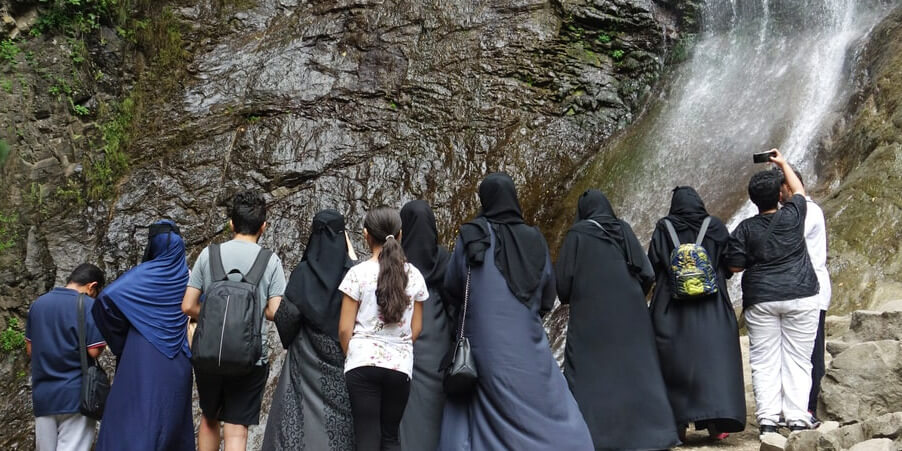Middle East tourist arrivals in Georgia soar 511% year-on-year
Georgia’s popularity is soaring as an affordable holiday and second-home destination, buoyed by easy visa requirements for Arab tourists.
Georgia has become one of the most popular destinations for holidaymakers and from the Middle East thanks to its scenic landscapes, affordable hotels, and proximity to the region, as well as the increasing availability of halal food and Arabic speaking guides.
In November 2021, Middle East tourist arrivals in Georgia soared 511 percent year-on-year to 103,500, reaching numbers close to pre-pandemic levels, statistics from the Georgian National Tourism Administration (GNTA) show.
The former Soviet state welcomed more than 150,000 travellers from the Middle East in 2019.
“Georgia is a budget tourism destination. You can stay in a hostel, hotel, or a fully furnished apartment for $30 per day, which is very cheap. The food is good quality and cheap, transportation is cheap, and the services are excellent,” said Islam Shalaby, founder and CEO at Yalla Georgia Travel & Tourism, to Salaam Gateway.
Tourists from the region, especially the Gulf Cooperation Council (GCC) countries, are now coming back on repeat visits, and they are spending entire months on the Black Sea, in villages around the green Caucasus mountains, or in the capital Tbilisi, home to the bustling Arab Quarter.
"GCC countries are one of our main strategic target markets. Once (having) travelled to Georgia, travellers from these countries tend to have longer stays, repeat visits as well as higher expenditures,” Medea Janiashvili, acting head of GNTA, said in a statement.
GNTA recently partnered with Wego, an online travel marketplace in the Middle East and North Africa, to promote the recovery of the tourism sector in Georgia.
According to Wego, around 100,000 searches on Georgia were made on the platform in November 2021. Solo travelers accounted for 63% of the searches, couples 22%, and families 15%.
Muslim-friendly tourism
A mountainous country located between Europe and Central Asia, Georgia is predominantly Christian, but it has a sizable Muslim community of more than 400,000, representing around 10% of the population.
A few mosques serve this community and they are mostly in large cities. Halal food, on the other hand, is widely available in Iranian and Turkish restaurants as well as at local eateries.
“In Tbilisi, halal food is everywhere. Even restaurants that are run by Georgians serve halal food, and the locals are friendly with Arabs and very peaceful. We have one mosque, in central Tbilisi, and it holds a Friday prayer every week,” said Taha.
The Jumah Mosque is one of Tbilisi’s most famous landmarks and probably the only one in the world where Sunni and Shiite Muslims pray side by side, according to Shalaby.
Batumi, the second largest city, has a few halal restaurants mostly offering Turkish cuisine, and one mosque. The city is the capital of Adjara, a region which lies on the Black Sea coast, north of Turkey, and where nearly 40% of the population practice Islam.
“Most of Georgia’s food is halal. When you visit any supermarket, you will find halal food and some even carry the halal label in the Georgian language,” said Taha.
Halal food is also available in cities with large Muslim communities, such as Rustavi and Marneuli, close to Azerbaijan, and Pankisi, south of the border with Chechnya.
“In regions along the borders with Muslim countries, you will find big Muslim cities,” said Shalaby, who is also creative director at Swef Land, an Egyptian-owned Tbilisi-based real estate developer.
Outside these cities, in Georgia’s villages, halal food is difficult to find but only because tourism is still new to the country, he said.
A home away from home
Georgia’s religious diversity and tolerance, as evident from the peaceful coexistence of Muslim, Christian and Jewish communities, together with its liberal visa regime, is encouraging visitors from the Middle East to come back and scout for a home away from home and set up businesses.
“When I first arrived here in 2017 as a student, there were very few Arabs. But now there are many Arabs who are studying and running businesses, including expats from Gulf countries,” Mohammad Taha, co-founder of International Business Group (IBG), a Tbilisi-based educational consultancy serving Arab students, told Salaam Gateway. “The number of students we’ve been registering has been doubling every year.”
Universities in Georgia have easier admission requirements compared to their European counterparts, which are harder to get into and where Muslim students may encounter Islamophobia, according to Taha.
“People started to notice Georgia because the prices are low, entry is easy, and the country is peaceful. Women feel safe going out anytime of the day or night,” he said.
While there have been a few Islamophobic incidents in recent years, such as the 2017 rally in Tbilisi, and the 2021 attack on Muslims over a new prayer space in western Georgia, they are few and far between, and the government usually intervenes.
For instance, in a rare case in 2019 when a hotel rejected a Muslim guest, the owner was given a jail sentence, according to Shalaby.
“When your country is wide open to everyone, you get all types of people,” he said, referring to illegal immigrants.
“Georgians felt overwhelmed at first. Arabic was suddenly everywhere on the streets and on shop signs next to Georgian. It could be a personal issue among a few, but it certainly doesn’t exist on a societal or political level,” said Shalaby.
© SalaamGateway.com 2021 All Rights Reserved
